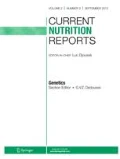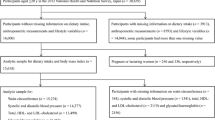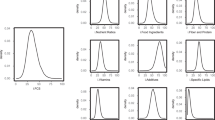Abstract
Purpose of Review
With the wide recognition of the importance of dietary patterns rather than isolated nutrient groups on health outcomes, numerous diet quality indices have been designed to evaluate the overall food intake quality in the last two decades.
Recent Findings
The newest version of the Healthy Eating Index (HEI), HEI-2015, is a diet quality index that measures adherence to the recommendations of the 2015–2020 Dietary Guidelines for Americans. While the key nutrient groups are included in most diet quality indices, differences in other components and the scoring system differentiate HEI. The Healthy Beverage Index (HBI) was recently introduced. Previous literature has confirmed the association of the older versions of HEI with metabolic syndrome, inflammatory markers, and negative health outcomes including cardiovascular disease, type 2 diabetes mellitus, chronic kidney disease, and all-cause mortality.
Summary
This review presents the existing evidence on the association of HEI-2015 and HBI with health markers and long-term outcome, provides guidance on their use, and identifies persisting challenges such as the development of simple, unified, and objective tools to characterize healthy diets in routine clinical practice.


Similar content being viewed by others
Data Availability
Not applicable.
Code Availability
Not applicable.
References
Papers of particular interest, published recently, have been highlighted as: • Of importance •• Of major importance
Krebs-Smith SM, Pannucci TE, Subar AF, et al. Update of the healthy eating index: HEI-2015. J Acad Nutr Diet. 2018;118:1591–602.
Reedy J, Lerman JL, Krebs-Smith SM, et al. Evaluation of the healthy eating index-2015. J Acad Nutr Diet. 2018;118:1622–33.
Chiuve SE, Fung TT, Rimm EB, et al. Alternative dietary indices both strongly predict risk of chronic disease. J Nutr. 2012;142:1009–18.
Fung TT, McCullough ML, Newby P, et al. Diet-quality scores and plasma concentrations of markers of inflammation and endothelial dysfunction. Am J Clin Nutr. 2005;82:163–73.
Fung TT, Chiuve SE, McCullough ML, et al. Adherence to a DASH-style diet and risk of coronary heart disease and stroke in women. Arch Intern Med. 2008;168:713–20.
Shivappa N, Steck SE, Hurley TG, et al. Designing and developing a literature-derived, population-based dietary inflammatory index. Public Health Nutr. 2014;17:1689–96.
Herrick KA TA, Afful J. Beverage consumption among youth in the United States, 2013–2016. NCHS Data Brief, no 320. Hyattsville, MD: National Center for Health Statistics. 2018.
Malik VS, Hu FB. Sugar-sweetened beverages and cardiometabolic health: an update of the evidence. Nutrients. 2019;11:1840.
Yerlikaya A, Dagel T, King C, et al. Dietary and commercialized fructose: sweet or sour? Int Urol Nephrol. 2017;49:1611–20.
Duffey KJ, Davy BM. The healthy beverage index is associated with reduced cardiometabolic risk in US adults: a preliminary analysis. J Acad Nutr Diet. 2015;115:1682-1689.e1682.
Trichopoulou A, Costacou T, Bamia C, Trichopoulos D. Adherence to a Mediterranean diet and survival in a Greek population. N Engl J Med. 2003;348:2599–608.
Al-Ibrahim AA, Jackson RT. Healthy eating index versus alternate healthy index in relation to diabetes status and health markers in U.S. adults: NHANES 2007–2010. Nutr J 2019; 18:26.
Hu EA, Steffen LM, Coresh J, et al. Adherence to the healthy eating index-2015 and other dietary patterns may reduce risk of cardiovascular disease, cardiovascular mortality, and all-cause mortality. J Nutr. 2020;150:312–21.
Schwingshackl L, Hoffmann G. Diet quality as assessed by the healthy eating index, the alternate healthy eating index, the dietary approaches to stop hypertension score, and health outcomes: a systematic review and meta-analysis of cohort studies. J Acad Nutr Diet. 2015;115:780-800.e785.
Jacobs S, Harmon BE, Boushey CJ, et al. A priori-defined diet quality indexes and risk of type 2 diabetes: the multiethnic cohort. Diabetologia. 2015;58:98–112.
Morze J, Danielewicz A, Hoffmann G, Schwingshackl L. Diet quality as assessed by the healthy eating index, alternate healthy eating index, dietary approaches to stop hypertension score, and health outcomes: a second update of a systematic review and meta-analysis of cohort studies. J Acad Nutr Diet. 2020;120:1998-2031.e1915.
Saklayen MG. The global epidemic of the metabolic syndrome. Curr Hypertens Rep. 2018;20:12–12.
•• Wagner S, Merkling T, Girerd N et al. Quality of beverage intake and cardiometabolic and kidney outcomes: insights from the STANISLAS cohort. Front Nutr 2021; 8:738803. This log-term follow up study highlights specific impacts of different beverage types and suggests that beverages could have an impact on kidney and cardiometabolic health.
•• Saraf-Bank S, Haghighatdoost F, Esmaillzadeh A, et al. Adherence to healthy eating index-2010 is inversely associated with metabolic syndrome and its features among Iranian adult women. Eur J Clin Nutr 2017; 71:425–430. This cross-sectional study showed higher healthy eating index-2010 scores were inversely associated with lower risk of metabolic syndrome and its components among Iranian women.
Xu Z, Steffen LM, Selvin E, Rebholz CM. Diet quality, change in diet quality and risk of incident CVD and diabetes. Public Health Nutr. 2020;23:329–38.
Khodarahmi M, Asghari-Jafarabadi M, Abbasalizad Farhangi M. A structural equation modeling approach for the association of a healthy eating index with metabolic syndrome and cardio-metabolic risk factors among obese individuals. PLoS One 2019; 14:e0219193.
Barbaresko J, Koch M, Schulze MB, Nöthlings U. Dietary pattern analysis and biomarkers of low-grade inflammation: a systematic literature review. Nutr Rev. 2013;71:511–27.
Ford ES, Mokdad AH, Liu S. Healthy eating index and C-reactive protein concentration: findings from the National Health and Nutrition Examination Survey III, 1988–1994. Eur J Clin Nutr. 2005;59:278–83.
Kant AK, Graubard BI. A comparison of three dietary pattern indexes for predicting biomarkers of diet and disease. J Am Coll Nutr. 2005;24:294–303.
George SM, Neuhouser ML, Mayne ST, et al. Postdiagnosis diet quality is inversely related to a biomarker of inflammation among breast cancer survivors. Cancer Epidemiol Biomarkers Prev. 2010;19:2220–8.
Monfort-Pires M, Folchetti L, Previdelli A, et al. Healthy eating index is associated with certain markers of inflammation and insulin resistance but not with lipid profile in individuals at cardiometabolic risk. Applied physiology, nutrition, and metabolism = Physiologie appliquée, nutrition et métabolisme 2014; 39:497–502.
Fargnoli JL, Fung TT, Olenczuk DM, et al. Adherence to healthy eating patterns is associated with higher circulating total and high-molecular-weight adiponectin and lower resistin concentrations in women from the nurses’ health study. Am J Clin Nutr. 2008;88:1213–24.
Piccand E, Vollenweider P, Guessous I, Marques-Vidal P. Association between dietary intake and inflammatory markers: results from the CoLaus study. Public Health Nutr. 2019;22:498–505.
Sakhaei R, Shahvazi S, Mozaffari-Khosravi H, et al. The dietary approaches to stop hypertension (DASH)-style diet and an alternative Mediterranean diet are differently associated with serum inflammatory markers in female adults. Food Nutr Bull. 2018;39:361–76.
Monfort-Pires M, Folchetti LD, Previdelli AN, et al. Healthy eating index is associated with certain markers of inflammation and insulin resistance but not with lipid profile in individuals at cardiometabolic risk. Appl Physiol Nutr Metab. 2014;39:497–502.
Kanbay M, Demiray A, Afsar B, et al. Role of klotho in the development of essential hypertension. Hypertension 2021:HYPERTENSIONAHA12016635.
Mazidi M, Shivappa N, Wirth MD, et al. Greater dietary inflammatory index score is associated with higher likelihood of chronic kidney disease. Br J Nutr. 2018;120:204–9.
Rouhani MH, Najafabadi MM, Surkan PJ, et al. Dietary inflammatory index and its association with renal function and progression of chronic kidney disease. Clinical nutrition ESPEN. 2019;29:237–41.
Esposito K, Maiorino MI, Bellastella G, et al. A journey into a Mediterranean diet and type 2 diabetes: a systematic review with meta-analyses. BMJ Open 2015; 5:e008222.
Widmer RJ, Flammer AJ, Lerman LO, Lerman A. The Mediterranean diet, its components, and cardiovascular disease. Am J Med. 2015;128:229–38.
Schwingshackl L, Hoffmann G. Adherence to Mediterranean diet and risk of cancer: an updated systematic review and meta-analysis of observational studies. Cancer Med. 2015;4:1933–47.
Sofi F, Macchi C, Abbate R, et al. Mediterranean diet and health status: an updated meta-analysis and a proposal for a literature-based adherence score. Public Health Nutr. 2014;17:2769–82.
Schap T, Kuczynski K, Hiza H. Healthy eating index-beyond the score. J Acad Nutr Diet. 2017;117:519–21.
Liese AD, Krebs-Smith SM, Subar AF, et al. The dietary patterns methods project: synthesis of findings across cohorts and relevance to dietary guidance. J Nutr. 2015;145:393–402.
•• Hu EA, Steffen LM, Grams ME, et al. Dietary patterns and risk of incident chronic kidney disease: the atherosclerosis risk in communities study. Am J Clin Nutr 2019; 110:713–721. This prospective study showed higher adherence to healthy dietary patterns during middle age was associated with lower risk of chronic kidney disease.
•• Shan Z, Li Y, Baden MY, et al. Association between healthy eating patterns and risk of cardiovascular disease. JAMA Intern Med 2020; 180:1090–1100. In large prospective cohorts with up to 32 years of follow-up, it has been shown that greater adherence to various healthy eating patterns was consistently associated with lower risk of cardiovascular disease.
Panizza CE, Shvetsov YB, Harmon BE, et al. Testing the predictive validity of the healthy eating index-2015 in the multiethnic cohort: is the score associated with a reduced risk of all-cause and cause-specific mortality? 2018; 10:452.
Harmon BE, Boushey CJ, Shvetsov YB, et al. Associations of key diet-quality indexes with mortality in the multiethnic cohort: the dietary patterns methods project. Am J Clin Nutr. 2015;101:587–97.
Ley SH, Pan A, Li Y, et al. Changes in overall diet quality and subsequent type 2 diabetes risk: three U.S. prospective cohorts. Diabetes Care 2016; 39:2011–2018.
Sikalidis AK, Kelleher AH, Maykish A, Kristo AS. Non-alcoholic beverages, old and novel, and their potential effects on human health, with a focus on hydration and cardiometabolic health. Medicina (Kaunas). 2020;56:490.
Narain A, Kwok CS, Mamas MA. Soft drinks and sweetened beverages and the risk of cardiovascular disease and mortality: a systematic review and meta-analysis. Int J Clin Pract. 2016;70:791–805.
Hu EA, Anderson CAM, Crews DC, et al. A healthy beverage score and risk of chronic kidney disease progression, incident cardiovascular disease, and all-cause mortality in the chronic renal insufficiency cohort. Curr Dev Nutr 2020; 4:nzaa088.
Smyth A, Griffin M, Yusuf S, et al. Diet and major renal outcomes: a prospective cohort study. The NIH-AARP Diet and Health Study. J Ren Nutr 2016; 26:288–298.
Afsar B, Afsar RE, Ertuglu LA, et al. Nutrition, immunology, and kidney: looking beyond the horizons. Curr Nutr Rep 2022.
Afsar B, Afsar RE, Demiray A, et al. Deciphering nutritional interventions for podocyte structure and function. Pharmacol Res 2021; 172:105852.
Lin J, Fung TT, Hu FB, Curhan GC. Association of dietary patterns with albuminuria and kidney function decline in older white women: a subgroup analysis from the Nurses’ Health Study. Am J Kidney Dis. 2011;57:245–54.
Chang A, Van Horn L, Jacobs DR Jr, et al. Lifestyle-related factors, obesity, and incident microalbuminuria: the CARDIA (Coronary Artery Risk Development in Young Adults) study. Am J Kidney Dis. 2013;62:267–75.
Rebholz CM, Crews DC, Grams ME, et al. DASH (dietary approaches to stop hypertension) diet and risk of subsequent kidney disease. Am J Kidney Dis. 2016;68:853–61.
Banerjee T, Crews DC, Tuot DS, et al. Poor accordance to a DASH dietary pattern is associated with higher risk of ESRD among adults with moderate chronic kidney disease and hypertension. Kidney Int. 2019;95:1433–42.
Asghari G, Yuzbashian E, Mirmiran P, Azizi F. The association between dietary approaches to stop hypertension and incidence of chronic kidney disease in adults: the Tehran lipid and glucose study. Nephrol Dial Transplant 2017; 32:ii224-ii230.
Whitham D. Nutrition for the prevention and treatment of chronic kidney disease in diabetes. Can J Diabetes. 2014;38:344–8.
D’Alessandro C, Piccoli GB, Cupisti A. The, “phosphorus pyramid”: a visual tool for dietary phosphate management in dialysis and CKD patients. BMC Nephrol. 2015;16:9.
Kanbay M, Guler B, Ertuglu LA, et al. The speed of ingestion of a sugary beverage has an effect on the acute metabolic response to fructose. Nutrients 2021; 13.
Cheungpasitporn W, Thongprayoon C, O’Corragain OA, et al. Associations of sugar-sweetened and artificially sweetened soda with chronic kidney disease: a systematic review and meta-analysis. Nephrology (Carlton). 2014;19:791–7.
Yuzbashian E, Asghari G, Mirmiran P. et al. Sugar-sweetened beverage consumption and risk of incident chronic kidney disease: Tehran lipid and glucose study. Nephrology (Carlton, Vic.) 2016; 21:608–616.
Kanbay M, Siriopol D, Copur S, et al. Effect of coffee consumption on renal outcome: a systematic review and meta-analysis of clinical studies. J Ren Nutr. 2021;31:5–20.
Haring B, Selvin E, Liang M, et al. Dietary protein sources and risk for incident chronic kidney disease: results from the atherosclerosis risk in communities (ARIC) study. J Ren Nutr. 2017;27:233–42.
Castillo-Rodriguez E, Fernandez-Prado R, Esteras R, et al. Impact of altered intestinal microbiota on chronic kidney disease progression. Toxins (Basel) 2018; 10.
Kanbay M, Onal EM, Afsar B, et al. The crosstalk of gut microbiota and chronic kidney disease: role of inflammation, proteinuria, hypertension, and diabetes mellitus. Int Urol Nephrol. 2018;50:1453–66.
Onal EM, Afsar B, Covic A, et al. Gut microbiota and inflammation in chronic kidney disease and their roles in the development of cardiovascular disease. Hypertens Res. 2019;42:123–40.
Afsar B, Vaziri ND, Aslan G, et al. Gut hormones and gut microbiota: implications for kidney function and hypertension. J Am Soc Hypertens. 2016;10:954–61.
Diotallevi C, Fava F, Gobbetti M, Tuohy K. Healthy dietary patterns to reduce obesity-related metabolic disease: polyphenol-microbiome interactions unifying health effects across geography. Curr Opin Clin Nutr Metab Care. 2020;23:437–44.
Heianza Y, Ma W, DiDonato JA, et al. Long-term changes in gut microbial metabolite trimethylamine N-oxide and coronary heart disease risk. J Am Coll Cardiol. 2020;75:763–72.
Ericson U, Brunkwall L, Hellstrand S, et al. A health-conscious food pattern is associated with prediabetes and gut microbiota in the malmo offspring study. J Nutr. 2020;150:861–72.
Shimizu C, Wakita Y, Kihara M, et al. Association of lifelong intake of barley diet with healthy aging: changes in physical and cognitive functions and intestinal microbiome in senescence-accelerated mouse-prone 8 (SAMP8). Nutrients 2019; 11.
Kirkpatrick SI, Reedy J, Krebs-Smith SM, et al. Applications of the healthy eating index for surveillance, epidemiology, and intervention research: considerations and caveats. J Acad Nutr Diet. 2018;118:1603–21.
Hedrick VE, Myers EA, Zoellner JM, et al. Validation of a rapid method to assess habitual beverage intake patterns. Nutrients 2018; 10.
Hedrick VE, Davy BM, Myers EA, et al. Changes in the healthy beverage index in response to an Intervention targeting a reduction in sugar-sweetened beverage consumption as compared to an intervention targeting improvements in physical activity: results from the Talking Health Trial. Nutrients. 2015;7:10168–78.
Locke A, Schneiderhan J, Zick SM. Diets for health: goals and guidelines. Am Fam Physician. 2018;97:721–8.
Health HTHCSoP. Healthy eating plate. In: The Nutrition Source, Department of Nutrition, Harvard University; 2011.
Duffey KJ, Poti J. Modeling the effect of replacing sugar-sweetened beverage consumption with water on energy intake, HBI score, and obesity prevalence. Nutrients 2016; 8.
Author information
Authors and Affiliations
Contributions
Contributed substantially to the conception or design of the work; or the acquisition, analysis, or interpretation of data for the work: Lale A. Ertuglu, Atalay Demiray, and Mehmet Kanbay. Drafted the work or revised it critically for important intellectual content: Baris Afsar, Alberto, Ortiz, and Mehmet Kanbay. Approved the final version to be published: Lale A. Ertuglu, Atalay Demiray, Baris Afsar, Alberto Ortiz, and Mehmet Kanbay.
Corresponding author
Ethics declarations
Ethics Approval and Consent to Participate
Not applicable.
Consent for Publication
Not applicable.
Conflict of Interest
The authors do not have any potential conflicts of interest to disclose.
Additional information
Publisher's Note
Springer Nature remains neutral with regard to jurisdictional claims in published maps and institutional affiliations.
This article is part of the Topical Collection on Cardiovascular Disease.
Rights and permissions
About this article
Cite this article
Ertuglu, L.A., Demiray, A., Afsar, B. et al. The Use of Healthy Eating Index 2015 and Healthy Beverage Index for Predicting and Modifying Cardiovascular and Renal Outcomes. Curr Nutr Rep 11, 526–535 (2022). https://doi.org/10.1007/s13668-022-00415-2
Accepted:
Published:
Issue Date:
DOI: https://doi.org/10.1007/s13668-022-00415-2




